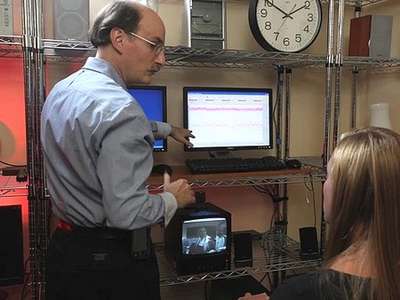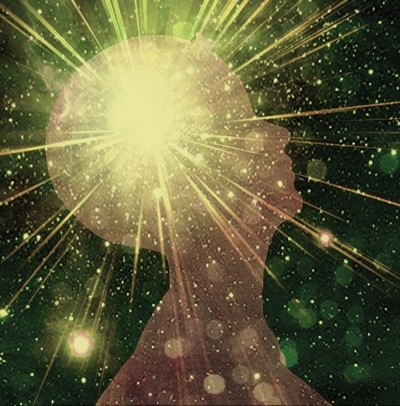
The Role of Psi in Human Affairs
by Sylvia Engdahl
This essay presents some of my ideas about how mythologies, among other things, spread through a society—ideas too unorthodox for me to go into in material for the course I taught on Space Age mythology. It also explains some of the ideas underlying my novels.*
I was once told in an online forum that if independently verifiable results of scientific psi experiments were published in a respectable peer-reviewed journal, “even a smallest such result would be a revolutionary change in the understanding of the world.” If only this were true. In fact many peer-reviewed studies have been published, and if even the smallest positive result could change most people’s understanding, there would have been a major revolution in science—and I believe in our view of history—long ago. However, there are too many people who don’t want to look at the results. They don’t want to change their understanding of the world. Scientists in particular are aware that if psi exists, the universe doesn’t work the way they think it does and they have built their careers on false premises. So they don’t read the relevant journals or the books that cite them, and thus preserve the comfortable (to them) illusion that only mystics and charlatans believe in phenomena that can’t be explained by materialistic science.
There is no doubt whatsoever that so-called paranormal (psi) abilities such as ESP do exist. This has been proven repeatedly by responsible scientific investigation and by use in once-secret military projects, quite apart from the extensive evidence from human history. But the issue is generally confused by all the other things, often silly things, associated in the popular mind with the terms “paranormal,” “psychic,” and “parapsychology,” and by the use of the word “supernatural” in connection with psi phenomena. Those that are real aren't in any sense supernatural; they are simply natural human (and in some cases animal) capabilities that we don't yet understand.

Dean Radin is one of the foremost scientific researchers in the field of parapsychology.
Properly speaking, parapsychology is the scientific, usually academic, study of psi: that is, extrasensory perception (ESP)—telepathy, clairvoyance (now often called remote viewing), and precognition—and psychokinesis (PK). It generally does not involve investigation of ghosts, although some scientists do include the question of survival after death, which I personally consider a separate issue, within its purview.
Skeptics are fond of pointing out that many people who claim to be psychics are frauds. Of course they are; but there is, after all, plenty of fraud in other areas. This does not mean that no one has real psi abilities. We don’t stop buying cars because some used car salesmen are crooks, nor do we distrust stockbrokers in general because some of them sell phony stocks. Genuine psychics with conscious control of their powers are rare, to be sure; most psi occurs unconsciously. In my opinion unconscious psi has been, and still is, vastly more prevalent than anyone imagines and has had a major impact on human history. Why isn’t this recognized? Why do so many otherwise open-minded people, scientists in particular, vehemently reject evidence that in any other context would be indisputable? As Kira says in Stewards of the Flame, it’s not because they think it’s nonsense, as they sincerely believe, but because underneath they are afraid that it’s not nonsense.
“Over and over, scientific evidence was presented for the existence of telepathy and other psi powers,” she tells Jesse. “By most people, especially other scientists, it was ignored, blocked out of consciousness—often angrily denied. Because if it exists, then everything familiar to you about your mind, your world, stands open to challenge. There’s nothing firm left to cling to. And if you have paranormal powers, who knows what you might do to disrupt the world, unwittingly, perhaps even unwillingly?”
Eminent psi researcher Dean Radin says in this passage from his book Supernormal, which I used as an epigraph to Herald of the Flame: “Real psychic effects lurking in the dark boundaries between mind and matter are so frightening and disorienting that defense mechanisms immediately snap into place to protect our psyches from these disturbing thoughts. We become blind to personal psychic episodes and to the supportive scientific evidence, we conveniently forget mind-shattering synchronicities, and if the intensity of the mysterium tremendum becomes too hot, we angrily deny any interest in the topic while backing away and vigorously making the sign of the cross.”
This reaction, though prevalent, is not widely recognized. And it is by no means the only obstacle to acceptance of psi. The major acknowledged factor is that there is as yet no theory to explain how it works. Psi violates all known laws of physics, so even people who believe in it are unable to see how it can work, though some researchers are now attempting to relate it to quantum physics. Personally, I think the basic premise that all reality can be reduced to physics, at the quantum level if not otherwise, is open to question; the fact that this is true of all phenomena so far understood tells nothing about what may be discovered in the future. Be that as it may, science has never accepted any area as worthy of study without some sort of theoretical foundation, and it is not likely to do so in the case of psi—not when scientists have built their knowledge of the universe on a materialistic concept of existence. When someone does come up with a viable theory, he or she will be classed by historians with Newton, Darwin, and Einstein; but meanwhile the evidence being swept under the rug.

One of the best books about Project Star Gate, a military psi research program. (Its title is misleading, as the project involved remote viewing rather than telepathy.)
Another main factor in psi’s rejection by scientists is that the use of paranormal abilities is not reliable. The results of lab tests are predicable only in the statistical sense; even the best psychics miss some of the time. This in itself would not be a serious objection, as many other scientific studies are based on statistics. But lab experiments cannot reveal more about psi than the fact that such abilities exist, since the controlled use of them requires more significant goals than pertain under lab conditions. It demands tasks of importance either to society or to the individual, and emotion of some kind must be involved. And even then, the information it reveals, while often true, is also often false. Remote viewers, for example, can see actual places or happenings, but some of what they see is not real—and they cannot tell the difference. Independent verification, which is generally hard to get on short notice, is always required. This was one reason (but not the only one) why the military “psychic spying” program of the 1980s-90s was discontinued.
Still another cause of opposition to psi is its long association with the occult, New Age ideas, and fringe beliefs. Throughout history psi phenomena have been dealt with by practitioners in these areas, as well as by many religions, especially Eastern religions—all of which have well-established traditional metaphors for explaining and controlling these phenomena. Outsiders find such metaphors, such as mysterious forms of healing energy or an invisible “third eye” that can perceive things not detectable through the senses, extremely off-putting, yet psychics who have learned to function through the use of them insist that they exist. Very few people understand the nature of metaphor. Both believers and nonbelievers generally assume that either a thing is literally true or it is false. To me, belief in metaphorical descriptions of psi abilities is exactly the same as Georyn’s belief in a dragon in Enchantress from the Stars—it is simply a way of perceiving truth that fits a person’s background. But scientists and others who consider themselves rational dismiss such beliefs as wacky, and tend to throw out the baby with the bathwater.
This, too, was among the many reasons for the abandonment of the military remote viewing program. Several people associated with that program, along with a few other prominent remote viewers, began looking for—and seeing—such things as alien bases on the moon and other planets, or underground on Earth, or insisting that extraterrestrials are trying to contact us. While this is not a traditional metaphor, it is a very common one today, among UFO cultists and “abductees” among others. It’s important to realize that many of these people are intelligent men and women who hold responsible positions, and are in no way mentally ill. They really did “see” alien bases. Psi works in this way; sometimes what’s seen is real and other times it is not, and the brain cannot distinguish real visions from illusions.

The similarities in descriptions of perceived alien encounters that were given before the media popularized them can't be explained by any normal means of transmission.
The interesting question is, why do people perceive similar unreal scenes? It’s usually said that in the past they believed in religious figures such as angels, and had seen pictures of angels, so that’s what they psychically saw; while now they’re familiar with the concept of aliens. That’s true, but I think there is a good deal more to it than that. In the first place the details of these visions, particularly the visions of those who think they’ve been abducted by UFOs (but not necessarily those of experienced remote viewers), are more alike than can be accounted for by any pictures or descriptions the people involved have been exposed to. In the second place, I believe, though it’s rarely if ever mentioned by analysts, that what’s seen is in fact metaphorical—it means something more than it seems to on the surface.
That is why some people accustomed to remote viewing have pursued a search for aliens despite the apparent foolishness of the effort. Unlike the average person they cannot shut off the ability to see, and they are drawn to the metaphor now dominant in the collective unconscious. It seems especially real to them because many other minds are unconsciously turned in the same direction, toward a prevalent symbol of emotions that are now widespread. In my essay “The Significance of belief in UFOs” I have suggested what these emotions may be. We live in an era of upheaval in human conception of the universe, now that the reality of space travel has made us aware that Earth is not isolated as has always been supposed—that not only may we someday enter unknown regions, but are already vulnerable to visitation from beyond. As I have explained in my essay “Confronting the Universe in the Twenty-First Century,” this is comparable to the uneasiness prevalent in the seventeenth century when people were absorbing the idea that Earth is not the center of the universe and the stars are not mere lights fixed to a crystal sphere. In the general public this shift in orientation produces deep unconscious anxiety. On the other hand, a minority is elated by it, and some (including some scientists and well as fringe cults) hope for aid from advanced extraterrestrial civilizations. Either way, the belief that aliens are present is a powerful symbol of these emotions, whether or not it is consciously recognized as such. So that belief is absorbed by the collective unconscious and is the source of metaphorical visions seen by those whose who are psi-receptive and whose personal unconscious feelings are particularly strong.
*
This is an example of how ideas have spread from person to person throughout human history. Psychiatrist Carl Jung, who introduced the concept of the collective unconscious, believed that its content is inborn in all humans, and since no one knows how it is transmitted, science generally holds that there is no such thing. Now, some people are saying that the collective unconscious consists of material spread throughout the population via unconscious telepathy, something that has always seemed to me self-evident. How else could thoughts spread, when there are countless cases that sensory transmission cannot account for? To Jung, the concepts held in common were limited to archetypes, but much more specific ideas are extensively shared; ideas have even been passed from one culture to another without any satisfactory anthropological explanation.
Almost all telepathy occurs on an unconscious level, which is why many people think that because they themselves aren’t psychic, and aren’t acquainted with anyone who is, ESP is rare if it exists at all. But parapsychologists believe that the capability is latent in everyone, and in my opinion it is active in everyone even though few are aware of it. To be consciously psychic is indeed rare, and the talent for it appears to vary widely, just as does musical or mathematical talent. Genetics probably plays a part in this. There are, however, many individuals who have occasional spontaneous psychic experiences, and many who do not but can nevertheless learn remote viewing. How much of the learning—and for that matter, the genetic aptitude—involves a special paranormal faculty and how much is simply a matter of ability to gain access to the content of one’s unconscious mind? How much spontaneous psi is the result not of unprecedented input, but of momentary breakthroughs of emotionally-significant aspects of what the unconscious mind receives all the time?

Intuition, spirituality, and psi functioning all arise from the unconscious mind.
It is well known that all so-called “right-brain” abilities—artistic creativity, spirituality, and intuition—arise from the unconscious mind, as do the roots of emotion. And conscious psi functioning, including psychic healing, requires the same kind of relaxation, the same letting go of “left-brain” logical thinking, as do these other activities; it is systematically practiced in preparation for all of them as well as in many religious traditions. Some people are better at this than others—at one extreme it comes naturally, while at the opposite one it’s virtually impossible; but everyone at least a minor degree of potential.
Thus it is quite possible that some of everyone’s ideas and feelings are continually, though unconsciously, made available to everyone else. There are speculators who view this as a group mind or hive mind, implying or even stating that there is only one consciousness of which individual minds are mere illusory parts. I disagree strongly with that theory; among other flaws, it leaves no room for privacy. The fear that others might read their minds is a major factor in skeptics’ reluctance to accept the reality of telepathy, and I think it is an unwarranted fear. Telepathy is not “mind reading” and individuals don’t have unlimited access to each other’s minds, either consciously or unconsciously. It’s not necessary to postulate a group mind to explain the collective unconscious, for psi is known to be instantaneous and therefore no time is needed for transmission of ideas and images.
This is not to say that the experience, common in mysticism and altered states, of feeling one with universe is not real. Certainly it is possible to merge one’s consciousness with others, and with something beyond human consciousness, so the awareness of individuality is temporarily suspended. But to me this is a matter of connection, not absorption. However closely connected minds may be, they retain the ability to function separately as long as they are alive; after that, no one knows, but I suspect personality exists in whatever form of afterlife there may be—something skeptics are more prone to believe in the case of loved ones than in their own case. Whether or not that’s true, psi in ordinary life involves communication either from one person to another, or more routinely to people in general.
It’s my belief that individuals communicate what they want, underneath, to share—both things they feel strongly about and background details of their surroundings and situation. Who has not longed to make others see what he or she is truly feeling, either to be understood as a person or to convince them of the rightness or wrongness of something? There is more than enough such longing among the population to fill the collective unconscious without resorting to a denial of individuality that precludes, among other things, personal bonds of love as distinguished from general love of all humankind.

Telepathic transmission of a culture's concepts may begin with a bond between mother and unborn child.
And so I believe that continuously, since ancient times, the feelings and convictions of the public about what matters in their lives have poured into a pool from which everyone can draw. By this means thoughts and visual images that are most common in a society are adopted by its members and become still more common. This leads, of course, to the spread of evil as well as good. Phenomena such as mass hysteria and mass racial hatred are universally acknowledged although their telepathic origin is not. And trivial enthusiasms such as fads are spread along with serious ones. But on the whole, the fears, hopes, and dreams of a culture are shared to an extent that has never been adequately explained under the assumption that sensory transmission is necessary.
In my opinion the ideas and imagery underlying mythology, as well as all the general knowledge taken for granted in a society including its concepts of right and wrong, is transmitted and absorbed in this way. The process begins in infancy, perhaps even earlier since I believe there is a telepathic bond between a mother and her unborn child. If this is true it sheds light on questions that are never raised because the answers are assumed to be obvious. Yet the sense of obviousness is not an inborn quality, nor is it usually the result of specific teaching. To take one example, why are young children who have never seen or touched live animals “naturally” attracted to mere pictures of them? What concept can a 3-year-old have of a cat or dog, let alone a lamb, before being exposed at least to a realistic movie? It can only come from the collective unconscious, formed by the love of animals felt by past generations.
Occasionally specific atypical feelings are drawn from this source. My mother told me that when I was small I was terrified by a picture of a goat. Neither I nor anyone I’d met had ever seen goats or heard anything bad about them, and I had no negative reaction to pictures of sheep, yet my fright was persistent. There are people who would say I must have been injured by a goat in a former life, but it’s more consistent with what we know about psi to postulate that such seemingly-inexplicable impressions are derived from a common store of strong feelings once experienced, and telepathically projected, by individuals who either lived in the past or are still alive. And in fact, in some occult mythologies goats are associated with the devil, which would surely have led to such feelings.

Charismatic leaders, both admirable ones and those who are evil, may be unconsciously telepathic. It is otherwise difficult to explain how Hitler gained a mass following.
Telepathy also accounts, I think, for the influence of great leaders, those who have inspired larger numbers of followers than can be accounted for by their outward difference from their peers. I believe they were telepathically gifted, whether or not they were aware of it, and projected their messages beneath the surface as well as through their words. This too has served both good and evil ends. At one extreme were the founders of major religions, who exemplify my belief that strong psi power is an advanced capability that in the future will be accompanied by moral advancement. To a lesser extent it applies to charismatic military or political leaders as well as entertainers such as rock stars who don’t appear to have any real talent beyond the ability to attract fans. And on the negative end of the scale lie rabble-rousers and rulers such as Attila the Hun and Adolf Hitler, whose acquisition of a mass following despite his lack of any prepossessing physical or mental characteristics has always been a mystery. I am not saying that any of these people used telepathy intentionally or were conscious of their talent for it; only looking back in the light of what is now known about psi can its significance to history be considered.
*
Will we ever be able to use psi capabilities consciously to a greater extent than is now done by a few exceptionally gifted psychics and trained remote viewers? I believe so, but this lies far in the future; it will be a major step in evolution, not, as some people think, a return to powers lost in the past. My original idea for my Flame novels was to explore how, and why, a civilization might begin to move from the present level of ours to that of Elana's people in Enchantress from the Stars, who had very advanced psi powers. It would be a long process, taking place over many generations, but it would have to start somewhere. And it would not be adaptive in the evolutionary sense for it to become widespread before a civilization has developed the technology necessary for expansion to many worlds. To turn to “inner space” before spreading into outer space, as some people advocate, would be self-defeating, since colonization of space is essential to a species’ long-term survival and to draw society’s focus away from logical “left brain” thinking would distract us from that.
Actually, lack of adaptiveness is the reason for our not having more psi capability at present. If humans already possess the genetic capacity for paranormal development—as is shown by the cases where it has been proven to occur—this capacity must have evolved biologically at some time in the past. There is every reason to think that it did so before our separation from our hominid ancestors, and in fact before the appearance of hominids, since ESP in animals is known to be common. (Though it’s beyond the scope of this short essay, not only have strong telepathic bonds between people and their pets been frequently demonstrated, but studies of wild animal behavior suggest that some aspects of it are the result of psi.) It is known, too, that psi faculties have been, and still are, used more in low-technology cultures—and presumably were in prehistoric ones—than in modern society. But the development of technology and the “left brain” rational mode of thinking it requires enabled our species to survive and thrive, and was therefore adaptive throughout most of human history. Thus “right-brain” modes of thought were suppressed and our primitive psi capabilities were largely forgotten. As early parapsychologist J. B. Rhine wrote, “psi is an elementary mode of reaction of the organism, one that probably represents the beginning of orientation in the initial adaptation to the environment,” since it has been found to be inhibited by “the more recently acquired intellectual powers.”

Firewalking is commin today among people without other paranormal abilities.
Why, then, do I view future development of human psi faculties as an evolutionary advance? Partly because I’m envisioning far greater paranormal powers than those of animals or our primitive ancestors, which I believe will be consciously employed. Conversational telepathy is one example, but psychokinesis too will become usable, as well as precognition, which has been shown to exist not only through lab experiments but through the remote viewing that has already been done. Whether people will ever be able to handle fire as they do in the Flame novels, I don’t know; I used that primarily as a symbol of abilities greater than we now imagine—still, there have been reports of its occurrence in the past, and firewalking is common even today among people without other paranormal abilities.
Evolution, however, is the result of adaptation, and what adaptive advantage would there be such capabilities? For one, there is surely survival value in becoming consciously aware of what our fellow-humans are thinking and feeling, which will greatly reduce the misunderstanding and lack of empathy that leads not only to unnecessary suffering, but to conflict. Conflict is a greater danger now than it was when it was merely a matter of fighting among small tribes. We may find psi indispensable in preventing it.
Another possible advantage—as was suggested by Robert Heinlein in his classic novel Time for the Stars, telepathy may be useful for communication with starships traveling much faster than electronic signals. Psi is independent of time and space. Possibly it will prove to be the only means through which interstellar colonies can communicate with each other and with Earth.
Or perhaps, if artificial intelligence develops to the point where it exceeds human intelligence as many researchers think it may, psi capability will be what distinguishes us from robots and gives us a competitive advantage over them. Since it is not in itself a function of the brain—though the brain may act as a filter to narrow what a person draws from the immense store of data in the collective unconscious—it is a power no artificial intelligence will ever have.
A more immediate value of psi is its role in healing—and, as described in my Flame novels, in preventing illness. The kinds of illness with which medical science can deal are limited. Contrary to its current premises, bodies are not machines that can always, at least in principle, be repaired. Much that goes wrong with them is caused by disturbance in the unconscious mind, so that when one illness is eliminated another arises to take its place, and some conditions are incurable. The characters in the novels gain volitional control of their unconscious minds, which enables them to stay healthy. The extent to which this, and/or psychic healing, involves psychokinesis is not specified; we simply don’t know how thought affects the brain’s production of neurotransmitters, and I chose not to include an imaginary explanation. But I postulate that unconscious telepathic communication with the instructor is needed to learn volitional control, and that in some, this leads to conscious use of ESP, so I suspect that PK ability is also awakened.

The development of control over our psi powers may in time have as much effect on our evolution as our rationality has had.
Past evolution of the human mind has shown a steady trend toward increased volition in one area after another—that is, action through the exercise of deliberate, conscious choice. As I said in my book-review essay “The Evolutionary Significance of the Metanormal” (available at my website), “What animals do, they do instinctively. The assertions of strict behaviorists notwithstanding, humans learn to choose; and the ability to choose is what has enabled psychosocial evolution—from the earliest divisions of labor to the most complex achievements of modern technology—to take place. If we had not gained control first over our day-to-day actions and then over our rational minds, we would still be living in the manner of our hominid ancestors. That we have not learned to control our emotional responses at the same pace is a truism, but against those who assert that this indicates some sort of pathology, I have always maintained that it is a natural consequence of our evolutionary stage. Emotional faculties, like other unconscious functions, are not as easy to control as rational ones; a different form of volition is involved, probably different even at the neurological level. Everything we have discovered about metanormal capabilities indicates that they too involve this other form of volition and that conventional “willpower” . . . is counterproductive in the actual attainment of non-rational skills. This is as well known to athletes as to mystics. . . . We may not unreasonably suppose that the survival value of such skills lies less in their specific utility than in the new form of volition underlying them, and that this may in the future have as much effect on the extension of human powers as our control over rationality has had.”
Personally, I believe that a major adaptive advantage in the controlled use of psi is that it’s necessary to enable us to meet advanced extraterrestrials on terms of equality, without language-based misunderstanding, and that they will not reveal themselves to us until we have gained it. This is a premise of all five of my novels dealing with extraterrestrial civilizations. But to offer it as an explanation for adaptiveness begs the question, since it must for some reason have been adaptive for the extraterrestrial species that preceded us.
We really
don’t really know how psi will prove adaptive, any more than primitive humans
knew where their newly-discovered reasoning powers would lead. Adaptiveness in
the non-genetic sense involves long periods of time and can be perceived only
with hindsight. But I think it’s safe to say that any increase in the powers of
human beings is in itself good, and that it may prove crucial in preparing us
for whatever we may encounter as we explore aspects of the universe presently
beyond our comprehension.
Copyright 2017 by Sylvia Engdahl
All rights reserved.
This essay is included in my ebook The Future of Being Human and Other Essays and in my book Selected Essays on Enchantress from the Stars and More.